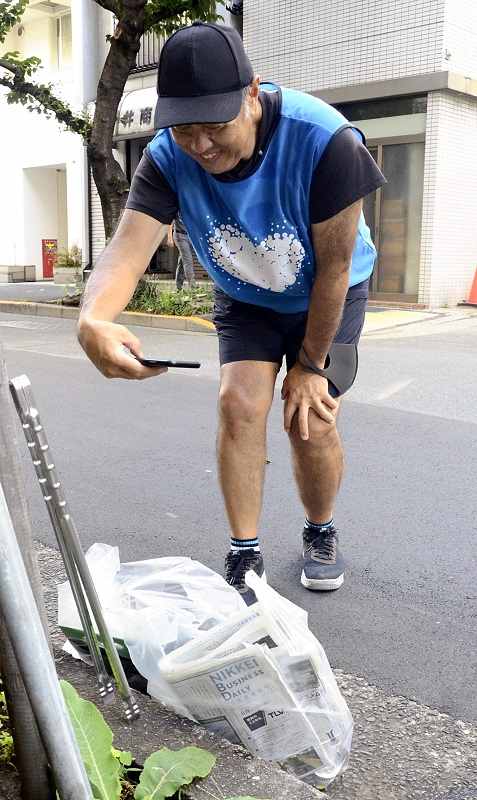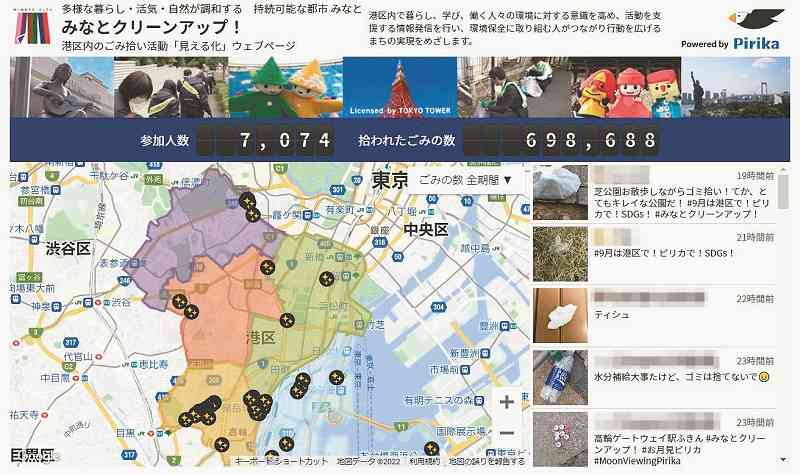App links volunteers, helps keep Japan neighborhoods clean

Takashi Yoshioka photographs trash he picked up in August in Minato Ward, Tokyo.
6:00 JST, October 8, 2022
Social media is helping Japan’s urban neighborhoods stay spick and span. Prior to the novel coronavirus pandemic, it was fairly common to see klatches of volunteers picking up trash on the streets, but societal fallout from COVID-19 made it difficult for people to gather in groups. Recently, however, social media apps and online networks are connecting like-minded folks who are keen to keep their local patches clean, with users posting photos of collected litter while helping inspire and motivate others.

Minato Ward’s website logs locations where litter has been collected, along with photos posted by volunteers. The number of people involved, and the amount of trash picked up is also shown. (The photo has been partially modified.)
Mapping achievements
In early August, Takashi Yoshioka picked up and bagged trash with a set of long tongs at Shiba Park in Tokyo. In just an hour, he cleared up about 80 cigarette butts, discarded masks and many other items. After photographing his “collection,” he uploaded photos to the Pirika social media app and almost immediately, began to receive “thank you” responses from other users.
Yoshioka, 57, heads Clean Up Frontier, a volunteer group based in Minato Ward, Tokyo. He began picking up trash last autumn and fits the activity around his schedule.
“[With the app,] I feel connected to others who share a common goal,” Yoshioka said. “The responses I receive help motivate me.”
Pirika was launched in 2011 by an IT company in Shibuya Ward, Tokyo. Users post details about how much trash they have collected and upload photos to the Pirika app or website, and the information is shown on a map. People can then show their appreciation by clicking a “thank you” button.
Minato Ward has been using Pirika since July of last year to encourage people to take part in cleanup activities. Yoshioka was among those who downloaded the software following the ward’s recommendation and has been using it for about a year.
“I enjoy using the app, as it keeps a record of my activities and gives me a sense of accomplishment,” he said.
Border-spanning activity
To date, Pirika has logged around 250 million pieces of collected trash in some 115 countries and regions. The app is free for individual users, but there is also a paid service that allows municipalities and companies to check how many people have helped pick up trash and the number of times litter has been cleared from specific areas. In 2019, six prefectures and cities in Japan were using service. That number has now increased to 16 prefectures and cities, including Akita, Kyoto, and Mie prefectures.
But Pirika is not the only way to connect like-minded volunteers: Kameoka City in Kyoto Prefecture uses its official Line account to share maps containing information on the amounts and types of trash collected by citizens. By using photos and statistics, the city hopes to raise awareness about the importance of keeping the city clean.
Awajishima island in Hyogo Prefecture began Sept. 17 running an app-based, monthlong campaign dubbed “Sanpo-de Gomihiroi.” Participants who photograph litter they have collected can earn points at designated stores and are entered into a draw to win Awaji beef packages, among other prizes. According to the organizer, about 5,000 people took part in the two previous campaigns.
Sayonara, garbage
Social media helps boost motivation among litter-clearing volunteers. Prior to the pandemic, large groups of street-cleaning volunteers were a regular sight on the streets of Tokyo’s Shibuya Ward. But due to the spread of the coronavirus, the number of such groups decreased from 167 in fiscal 2019 to just 28 in fiscal 2020. In a bid to encourage people to reengage with neighborhood-beautifying activities, the ward government began using Pirika in July 2021.
The ward also began a cleaning equipment-lending service, which helped boost volunteer numbers to around 180 a month on average since August 2021 — a 150% percent rise from pre-pandemic figures. This increase in personnel has resulted in a tenfold increase in the amount of trash collected.
This year, Pirika users have earmarked a special clear-up following Halloween on October 31st, when garbage often accumulates after high-spirited revelries.
“We hope that [trash-clearing] activities will take root and help keep the city clean,” said Shibuya ward official Masaki Aoki.



